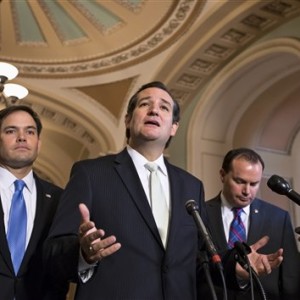A representative of the National Security Agency on Thursday said NSA is “confident” its new telephone surveillance program can strike the balance between privacy and national security, while giving the agency “access to a greater volume of call records” than it had previously.
“NSA will in due course, as it gains experience with the new process, report to Congress about the efficiency of the new arrangement,” NSA General Counsel Glenn Gerstell wrote in Lawfare Thursday of the new telephone metadata surveillance framework, which took effect at the end of November.
“NSA is confident, however, that it can operate the new scheme in compliance with the law, while still obtaining information necessary to help protect our country, and it believes that the country’s telephone companies will similarly fulfill their roles under the new statute,” he continued.
“Largely overlooked in the debate that has ensued in the wake of recent attacks is the fact that under the new arrangement, our national security professionals will have access to a greater volume of call records subject to query in a way that is consistent with our regard for civil liberties.”
The debate over the new program, established under the U.S.A. Freedom Act by Congress last June, has played out largely on the 2016 Republican presidential debate stage in recent months, where Florida Sen. Marco Rubio has taken a hawkish stance against NSA reform since Congress took up the bill two years ago.
During the Republican primary debate in Las Vegas last month, Rubio sparred with Texas Sen. Ted Cruz over the legislation, which the staunch civil liberties advocate co-sponsored in the upper chamber.
“The old program covered 20 to 30 percent of phone numbers to search for terrorists,” Cruz said of the now-shuttered “Section 215 program,” named after the section in the Patriot Act NSA interpreted as permission to collect and store virtually all Americans’ landline telephone records, including numbers dialed, call durations and locations.
“The new program covers nearly 100 percent,” Cruz continued, pointing out the new framework lets the agency subpoena wireless records as well, though in a more limited, specified fashion — an area it previously admitted struggling to include within its scope of surveillance.
“That gives us greater ability to stop acts of terrorism, and he knows that’s the case,” Cruz said.
“Let me be very careful when answering this, because I don’t think national television in front of 15 million people is the place to discuss classified information, so let me just be very clear — there is nothing we are allowed to do under this bill that we could not do before,” Rubio countered.
Both are technically correct — while the new program streamlines the process of collecting landline and wireless records, removing technical delineations and mandating telephone companies provide all numbers and corresponding metadata matching specific queries, it doesn’t actually create any new legal authority to subpoena records.
“Under the new arrangement, the phone companies, not NSA, continue to retain their phone call records,” Gerstell explains. “The FBI (on behalf of NSA) can apply to the FISA Court for specific authority to inquire about a particular phone number or other identifying element, but only if based on a ‘reasonable, articulable suspicion’ that it is associated with international terrorism.”
“The phone company will reply with a list of numbers, if any, that the first number was in contact with,” he goes on. “NSA is then permitted to perform a similar inquiry on the secondary numbers — but cannot further investigate the results of the second inquiry to see subsequent levels of contact.”
While others outside the agency have expressed optimism about the program’s projected effectiveness, including FBI Director James Comey, NSA Director Mike Rogers was unequivocal in telling Congress the new program would be less effective and slow the agency down during a hearing at which Rubio was present last year.
Rogers said the agency would be unable to respond to emergency situations “in minutes,” as it previously could with emergency powers to access the metadata database he had under the 215 program. He also pointed to a National Academy of Sciences study that found no technical equivalent to collecting bulk telephony metadata to satisfy national security requirements.
If elected president, Rubio has said he will push to restore and expand surveillance powers deprived of NSA and other agencies in the wake of the Snowden leaks.

